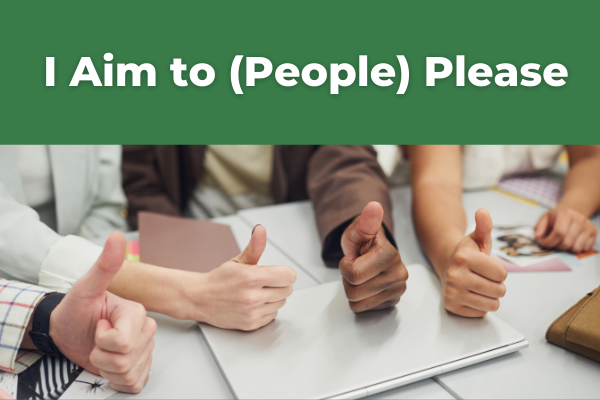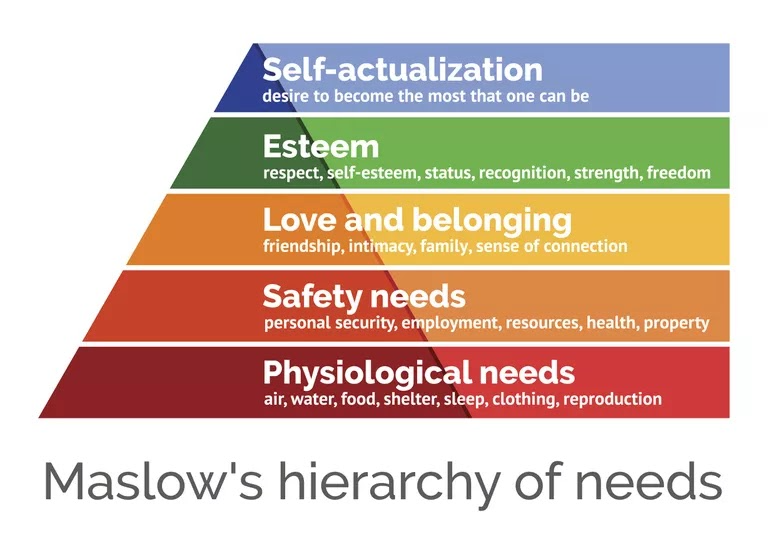Join Stop Charting at Home absolutely free & learn to leave your work at work
Today starts a run of posts related to people pleasing, a topic which shows up all too often in medicine.
This post will explain who people pleasers are exactly and how they develop this tendency.
Subsequent posts will look at how people pleasers show up within medicine as well as ways to curb the problematic thought patterns that drive this behavior.

Disease to Please
Do you know anyone in your life who:
- bends over backwards to make sure the needs of everyone around them are met
- Is the reliable “go-to” helping out when anyone needs something done
- always tries to avoid conflict
- apologizes all the time
- feels guilty for saying “no”
Perhaps it’s you?
Wait, where did you just come from? What were you doing? Why can’t my hair do that?
These are descriptors of people pleasers.
People pleasers are people who have an emotional need to please others often at the expense of their own needs and well-being. They have an underlying urge to make others happy and to be positively regarded for doing so.
(In case you were wondering, it’s not a disease—I was just going for the rhyme with the header.)
Not everyone who is kind is a people pleaser. Some people genuinely enjoy helping without seeking such validation. This is NOT about those unicorns 
The tendency to please others arises from our upbringing, which I’ll get to in a moment.
You may view people pleasing as a positive thing. After all, who wouldn’t want to help out others? That’s just being kind and generous with our time, right?
No doubt we are social creatures and a large part of our social fabric relies on being attuned to the needs and feelings of those around us. But taken too far, such attunement to others has a deleterious impact on us.
The Problem with Pleasing
Why? Well, relying on others’ approval to feel good about yourself means you can never nurture an internal sense of worth.
Conditional happiness falls apart when the conditions aren’t met, and in this case they are all external to you, over which you actually have no control.
You could go out of your way to help others and they could still turn around and ignore or dismiss what you’ve done for them, or worse still, be outwardly ungrateful or nasty. Now what happens to your happiness if you were relying on that praise?
If it wasn’t clear, the baby turtle was your happiness. Getting washed away.
The pressure of managing others’ emotions (what people pleasers try to do) can be frankly exhausting. It piles on additional emotional labor.
Being who you think others want you to be means you’re eschewing actual connection with others because you’re never truly being yourself. In order to be as agreeable as possible and avoid conflict, chances are you don’t share your opinions or views. You never express the real you!
Always putting yourself on the backburner only leads to dissatisfaction and resentment.
Sound like any physicians you know?
Conditioned to Be a…Doormat?
A lot of what I learned about people pleasing came from Sara Bybee Fisk, a bonafide badass and my instructor during my coach training at the Life Coach School. It wasn’t part of the curriculum, but this is her coaching niche and I’ve followed her content since my certification.
So I’d be remiss not to give her credit for most of the ideas within the next two sections which were either informed by or pilfered from her content.
Like so many of the other negative belief patterns we’ve explored (e.g., perfectionism, imposterism, etc.), people pleasing stems from not believing that we are inherently worthy.
Thus we seek external validation of our worth in the form of recognition and praise for helping others.
I mentioned that we are social creatures earlier, but why do we do this?
We were inadvertently taught to do so!
It’s safe to say that most of how we interact with our world is shaped by our early primary caregivers. They (hopefully) helped create and maintain rules that (hopefully, again) promoted safety, security, and predictability. I know this is a broad generalization, but I’m using it to demonstrate how people pleasing arises.
Maslow’s Hierarchy of Needs demonstrates that this is the second tier of needs after our physiological needs (food, water, air, sleep, etc) are met.

As children, we often received praise for doing things we didn’t want to do.
Maybe we didn’t want to eat all of our dinner/clean our plate (or, if you’re like my toddlers, eat ANY of your dinner) and just wanted to play. However, through trial and error, we learned that not doing so led to grumpy parents. Conversely, cleaning our plates led to happy parents who subsequently showered us with praise.
This shaped our entire worldview: subconsciously we learned to do what others wanted because doing so garnered us approval. And approval led to all the good feels—namely, a dopamine cake topped with oxytocin frosting! Mmmm…taste the feelings!
Gotta Get Some R&R…&R
Fisk, my coaching instructor, describes our interactions with the world via the three Rs—roles, rules, and rewards.
We are reared to fulfill certain roles bound by certain rules. If we take on those roles and abide by those rules, then the rewards will come.
People pleasing is more common in women simply based on assigned gendered roles and the rules assigned to them. Women are generally viewed and treated as caretakers. And this role, and the grooming provided it, tends to involve more people pleasing!
Fisk’s own example adds credence to this. She grew up in a large family and as an older (possibly the eldest—I don’t recall) child she was expected to help raise her younger siblings. I’m loosely basing this on what Fisk has said, since I don’t remember all the details.
Her defined role was as surrogate parent. She did not have a choice in her role; it was assigned to her.
She had caretaking rules to follow to fulfill the role.
And if she did well following the rules in her role? She would be praised.
Some praise took the form of, “Thank you for getting your brothers/sisters their dinner.”
Other praise was more addictive, such as, “You were so helpful today.”
The unsaid portion of these examples of recognition is, “…in your role following the rules we’ve laid out.”
Such approval meets our third level of needs, that of love and belonging (see Maslow’s Hierarchy above).
It’s important to note that our parents were not trying to emotionally manipulate us. They were trying to do their best (again, hopefully). But life is messy and parenting is damn hard.
The Path to Self-Abandonment
This comes up a lot for those of us who were never given the freedom to make choices as toddlers and young children. We were told what to do and we did it (reward) or didn’t do it (punishment).
We were never asked what we want or what we think.
A lot of things, but I’d start with the survival of our democracy and an end to the pandemic, maybe?
Obviously, I’m not going to let my kids decide who gets to drive the car (mostly because their and the toy T-rex’s arms are too short to reach the steering wheel), but maybe I could ease up and let them choose the veggie for dinner.
It’s like asking a kid in clinic which ear they want me to look at first (giving a guided choice) versus asking more generally if I can look in their ear (and then doing it even if they say “no”).
If our voices aren’t elevated and valued as kids, then we tend to suppress them and defer to others even as adults.
We learn to meet our needs for love and attention by doing things for others and disconnecting from our own needs. This is important: people pleasing DOES get our needs met, which is why we continue to do it.
Despite abandoning our own intrinsic needs, we still derive pleasure from external approval of meeting others’ needs. This is almost like a false need that people pleasing satisfies, like an extreme form of buffering. If it did not serve us in any way, then we would not do it.
The issue is that it keeps us trapped at the third level of Maslow’s Hierarchy; we cannot get to the highest level where we experience self-actualization because that requires that we are able to acknowledge our inherent self-worth and not rely on external validation.
The self-abandonment carries forward into adulthood in all manner of maladaptive ways that we will explore next week.
Are you a people pleaser? Do you think your childhood shaped it? Let me know in the comments below.
If you haven’t subscribed to my email list, then do so below so you don’t miss my new posts or my weekly updates (only for subscribers).
I’d also be most appreciative if you shared this post with anyone whom you think would benefit from the content or message of the blog. They may similarly be most appreciative 
